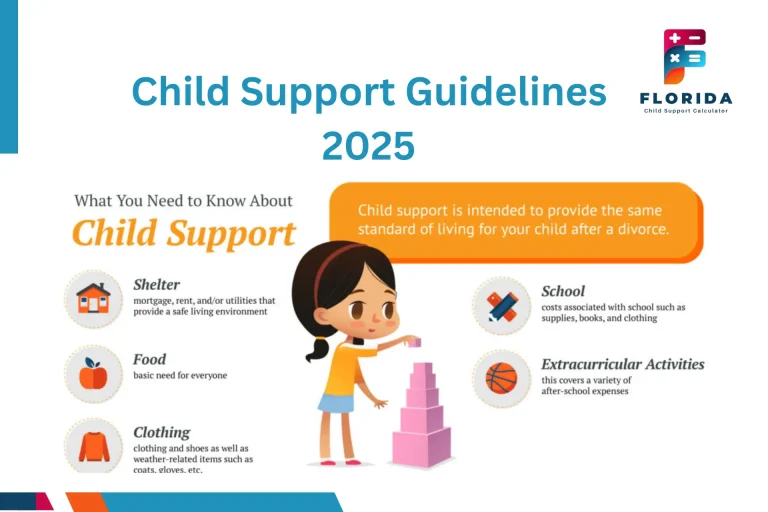How Accurate Is the Florida Child Support Calculator
How accurate is the Florida Child Support Calculator? Well, think of it like a recipe; it looks simple, but with one wrong measurement, the whole cake collapses. This tool gives you a quick estimate of how much child support one parent may owe, but it doesn’t always match what a Florida court will decide. Why? Because real life is a mess, incomes shift, parenting time gets tricky, and expenses like surprise birthday parties pop up.
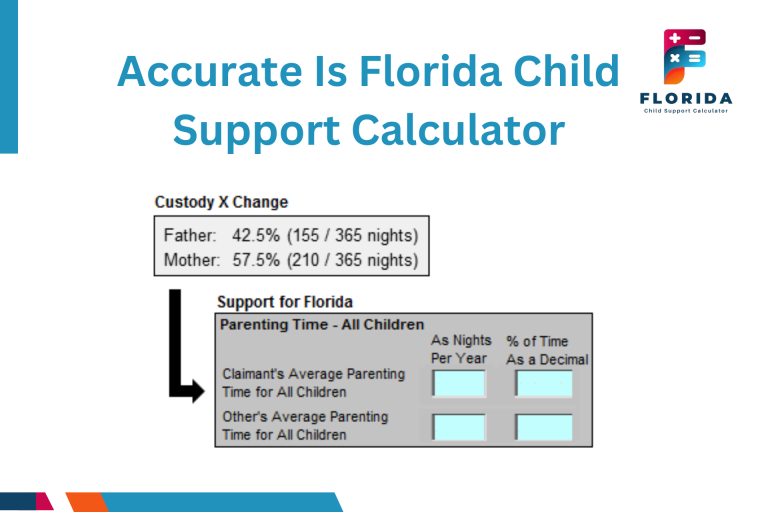
Before relying only on the calculator, it’s smart to understand how Florida calculates child support and what factors can influence the final amount. Want to see what else affects it? Check out these common mistakes in child support calculations.
What Is a Child Support Calculator and Can You Trust It?
A child support calculator is like a money guide that helps parents estimate how much support they should pay. It uses income, parenting time, and a few costs to show a number. But here’s the catch: it’s not always the number a Florida judge will choose in court. Real-life things can change that number fast.
If you’re still figuring out how Florida handles these payments, it helps to review the Florida child support guidelines first. And if you’re wondering how income fits in, you can also check how child support is calculated from your income.
Understanding Florida’s Child Support Guidelines
Florida follows rules written in Chapter 61.30 of the law. These rules say how much money each parent should give based on what they earn, how often they care for the kids, and how many kids they have.
It’s not a guess, it’s a formula. But even that formula has room for the judge to tweak it. You can read more about the things that affect it in this guide on factors that influence child support. Some of them might surprise you.
What Inputs Are Required for Accurate Results?
To get the right number, the calculator needs honest, complete details. That includes income from jobs, bonuses, and even part-time work. You’ll also need info about child care costs, health insurance, and overnights.
Parents often ask, “Do both people enter their income?” Yes, they should. Otherwise, it’s like building a puzzle with half the pieces. And if you’re stuck figuring out what counts as income, this child support income page breaks it down step by step. At the end of your calculation, save a copy, it may help in modification cases later.
Why the Florida Child Support Calculator Might Miss the Mark
The calculator is smart, but it’s not perfect. Think of it like a GPS; it shows the fastest route, but it doesn’t know if there’s a surprise detour, like a fallen tree or roadwork. In the same way, life can throw things at parents that don’t fit the calculator’s numbers.
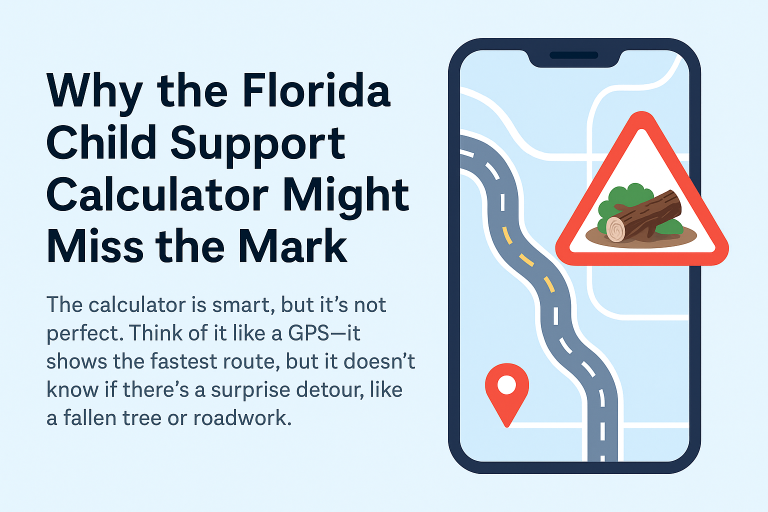
In fact, there are many real-world reasons why the amount you see on the screen might not match what a judge decides. Florida courts often review the final amount carefully, especially when there are issues like hidden income or uneven parenting time. If you want to explore how the law allows changes in support, this article on child support modification in Florida is worth looking into. And don’t forget, child support laws in Florida also explain why the calculator is only part of the story.
The Calculator Is a Tool, Not a Final Court Order
Some parents think the number the calculator gives is final. It’s not. It’s just a tool. The court has the last say. Judges can lower or raise the amount based on special needs, extra expenses, or parenting schedules.
In many situations, what actually happens in court is different from what parents expect. That’s why it helps to look at the real factors judges use to calculate child support before going to court.
Time-Sharing Miscalculations That Affect Accuracy
The number of overnights each parent spends with the child can change the support amount a lot. If someone says they have 50/50 time but don’t, the calculator might show a lower number than what’s fair.
This is where problems begin. Parents often enter numbers that don’t match the real schedule. You can avoid this mistake by checking your time-sharing details and comparing them with how child support is calculated in Florida’s official system. It’s one of the most common errors that leads to court corrections.
Common Mistakes in Income Reporting
Let’s be honest. Not every parent puts their full income in. Some hide bonuses. Others don’t report part-time jobs. That’s how the calculator can end up way off.
Courts don’t like that. If the judge finds out someone lied or skipped income, they can “impute” income, which means they guess what the person should be making. If you’re unsure what counts as income, here’s a useful page on how Florida courts calculate child support income. Skipping details may also affect future cases, like a jail for unpaid child support situation, where enforcement becomes serious.
Factors the Calculator Doesn’t Include But Courts Do
The Florida child support calculator might seem complete, but it doesn’t include everything. Real life brings surprises, and not all of them fit inside a calculator box. Judges often have to look at what the calculator missed, things like extra bills, travel, or special needs.
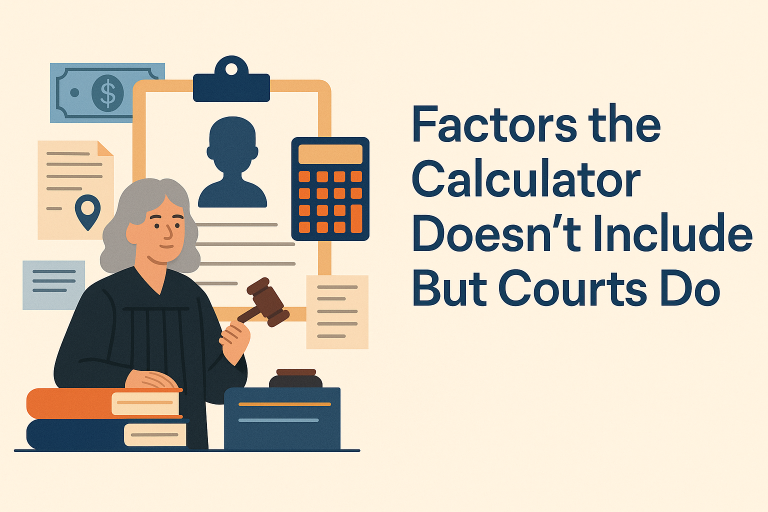
Many of these details are covered in the state’s official child support laws, and they play a big part in how your final number is decided.
Travel Expenses for Visitation
If one parent lives far away, travel costs can get high. The judge may reduce support to help cover things like plane tickets or long drives. The calculator doesn’t ask about this, but courts take it seriously.
You’ll find that these adjustments are part of modification requests in Florida when travel becomes too expensive or too regular.
Special Needs or Medical Conditions
Some children need extra medical help, therapy, or care. These costs aren’t always added in the calculator, but are very real to the court. Judges often raise support to cover these special needs.
At times, the support amount also depends on who is paying for the medical insurance. That’s one of the key income-related details courts review before finalizing support.
Housing & Financial Hardship
If one parent is struggling to pay rent or is unemployed for a real reason, the court might reduce the support. But this isn’t automatic, the parent has to prove their hardship.
Even though these cases are less common, they can show up when someone is already dealing with unpaid child support and needs help to avoid further penalties.
Parents Can Agree on a Different Support Amount (With Court Approval)
Sometimes, both parents talk and agree on what works best, and it’s different from what the calculator says. That’s okay, as long as the court signs off. Judges want to see that the child’s needs come first and that no one is being unfair.
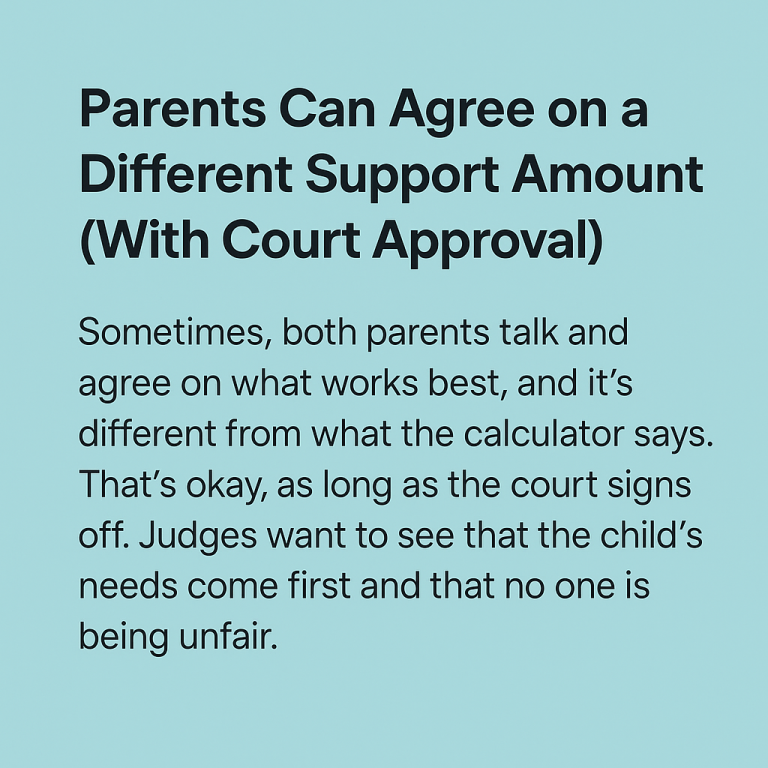
At the start of any parenting plan or negotiation, it’s helpful to understand how Florida allows changes. If both sides are honest, the court may allow more flexible terms than what’s shown by the calculator alone.
Flexibility Within the Law
Even if parents agree, the court checks if the amount is fair. They look at income, time-sharing, and expenses. If the deal looks unfair to the child, the judge won’t approve it.
To avoid issues, many parents also bring a filled-out child support worksheet to show their numbers clearly.
Agreements Must Still Be Approved by a Judge
This part is super important, only the court can turn an agreement into an official order. Even if both parents say, “We’re fine with this,” it’s not real until the judge says yes.
To make sure the judge agrees, it also helps to follow the official child support guidelines when deciding the amount.
Modeling Your Real Income and Household Expenses
If your income and expenses aren’t right in the calculator, your results won’t be right either. Think of it like typing wrong numbers into a calculator; the answer may look neat, but it’s still wrong. Parents need to be honest when showing what they earn and spend.
This matters even more when requesting child support changes or when there’s a big shift in jobs, housing, or care.
What Real-Life Numbers Might Look Like
Here’s a simple table to understand how your input changes the result:
| Item | Parent A | Parent B |
|---|---|---|
| Monthly Gross Income | $3,500 | $2,500 |
| Health Insurance (Child) | $150 | $0 |
| Childcare Costs | $300 | $0 |
| Overnights Per Year | 100 | 265 |
You can see how income and parenting time can shift who pays what. These numbers matter more than you think. That’s why some parents use this info before calculating with the Florida support tool.
Tools That Help: Florida’s Support Calculator and Mobile App
When it comes to figuring out child support in Florida, tools make things easier. The state offers a free online calculator and even a mobile app that can give you a quick estimate. But remember, it still depends on how correct your inputs are.
At the start, many parents try the Florida child support calculator to see a rough number. It’s helpful for planning and court prep.
Florida DOR Official Calculator
The Florida Department of Revenue has an official calculator where you enter both parents’ income, kids’ details, and other costs. It follows the state’s guidelines and gives a monthly amount.
Still, this tool doesn’t know everything. That’s why courts often look deeper into what factors can change child support before making a final decision.
Child Support Mobile App (iOS/Android)
Florida’s support calculator also comes in a mobile version. It works almost the same, but is more useful if you’re on the go. Some people use it during court meetings or while updating parenting plans.
Just like the desktop version, results from the app aren’t final. If your income or living situation changes later, you may need a support modification anyway.
Save a Copy for Court Use
Always save your calculations as a PDF. Courts often ask for a printed copy when parents disagree. It helps show your effort and keeps everyone on the same page.
When preparing for court, also check that your numbers match the official Florida support guidelines. That way, you avoid surprises later.
Calculate Child Support in Florida: Best Practices for Real Accuracy
If you want to get the most accurate result, it’s not just about using the tool, it’s about using it the right way. Even small mistakes in your inputs can lead to big differences in the support number.
From income to overnights, everything counts. Many errors come from entering the wrong information or skipping important costs. This is why understanding how Florida calculates support is so important from the start.
Be Precise with Parenting Time and Income
The more exact your info is, the better. Count overnights carefully. List your full income, including bonuses and side jobs.
A lot of parents guess or round up numbers. That’s risky. If you’re unsure what counts as income, the state’s rules for income calculation can really help.
Don’t Ignore Deductions and Costs
Health insurance, daycare, and taxes all matter. If you skip them, the calculator might show a higher payment than needed.
To see which deductions apply in Florida, take a look at how support obligations are handled legally.
Save and Recheck the Output
Before using your result in court, save the file. Then double-check everything, numbers, parenting time, and expenses. This helps when the judge asks questions or if the other parent disagrees.
Also, if your financial life changes, the saved info helps if you later request reduced child support in court.
FAQs About Florida Child Support Calculator Accuracy
Parents have tons of questions about the calculator. Is it official? Can it be wrong? What if your situation changes? These quick answers help clear things up fast.
You’ll see that the calculator is helpful, but not perfect. Real-life stuff often makes courts go beyond what the screen says. That’s why child support cases in Florida are handled with care.
Final Thoughts: The Calculator Is a Starting Point, Not the Final Word
Let’s be real. The Florida child support calculator is like a flashlight; it shows you where to step, but it doesn’t light the whole road. It’s helpful, especially when you’re just starting to figure things out. But it’s not the boss. The judge is.
So yes, the calculator gives you an estimate, but don’t forget to check how Florida child support laws and courtroom decisions can shift the outcome. From time-sharing changes to income surprises, the final support amount often includes things the calculator never asked about.
Before you trust a screen, make sure your numbers are solid. Double-check your income, overnight visits, and any real expenses. Want to know what else can raise or lower support in Florida? You’ll find plenty of real-world insight on factors that influence support decisions, especially when both parents don’t agree.
And if life changes later, new job, lost hours, or new expenses, don’t panic. Florida courts allow you to request a support modification when things shift.





